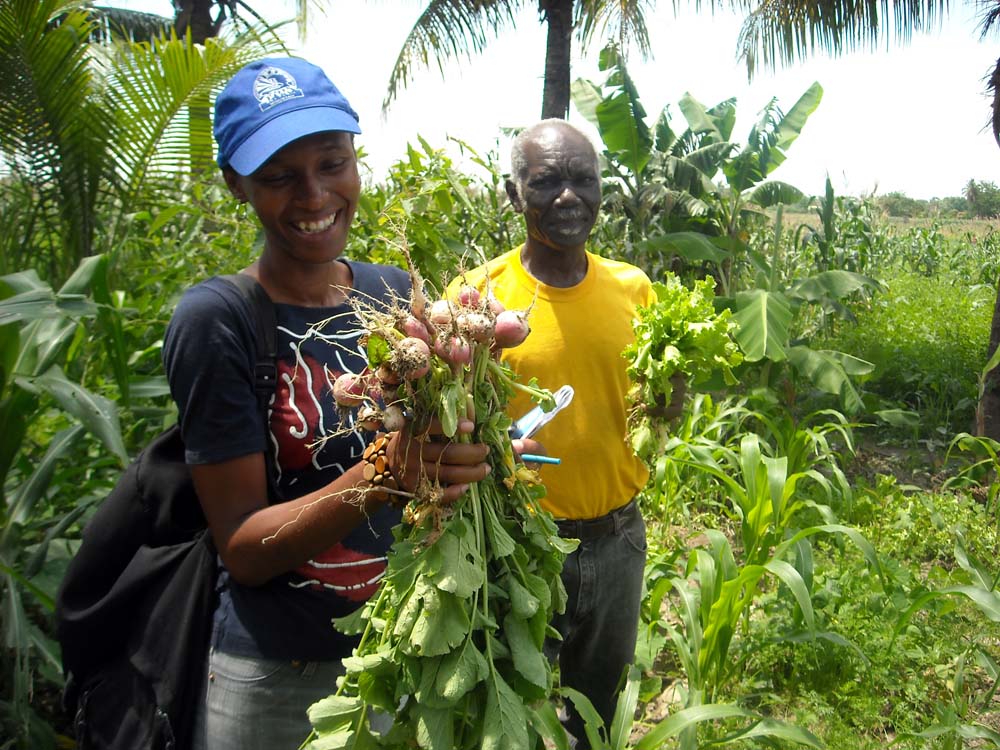They will work together to relaunch INTA’s Pro Huerta Program, which was implemented successfully between 2006 and 2015. With the participation of IICA specialists, the two institutions aim to improve the food security situation in the Caribbean country.

BUENOS AIRES, 7 July 2022 (IICA). The Government of Argentina and the Inter-American Institute for Cooperation on Agriculture (IICA) are to work together on a new international cooperation initiative aimed at improving the food security situation in Haiti.
The decision was agreed at a meeting in Buenos Aires involving Sabina Frederic, Director of the White Helmets, Argentina’s agency for international cooperation and humanitarian assistance; the President of the National Agricultural Technology Institute (INTA), Mariano Garmendia; and the Director General of IICA, Manuel Otero.
The initiative marks the relaunch in Haiti, where the food security situation has deteriorated, of INTA’s Pro Huerta Program, which was implemented successfully between 2006 and 2015, also with the participation of IICA specialists.
The Pro Huerta Program aims to build the capacities of smallholders in the areas of agroecological production and access to healthy food for a balanced diet.
The formal title of the initiative is “Agroecological School Gardens in Haiti as a Strategy for the Construction of Food and Nutritional Security.” It will focus on educational efforts aimed at improving the food security and nutritional health of vulnerable local communities, with a strong pedagogical emphasis on food production.
During the meeting in Buenos Aires, Frederic explained that last January the Government of Haiti had expressly asked the Argentine authorities to reactivate the Pro Huerta Program in the country. The request was made during the 22nd Summit of Foreign Ministers of the Community of Latin American and Caribbean States (CELAC), which took place in Buenos Aires.
“The food security situation in Haiti is serious, and for that reason we will draw on the experience of the Pro Huerta Program to assist vulnerable people. There is a lot that Argentina can do to help,” Frederic added.
The President of INTA, Mariano Garmendia, pointed out that “the overarching objective of the cooperation in this instance is to promote the role of the school as a social actor that can provide tools for the food security and nutritional health of the local community. This will be achieved through the promotion, planning, and implementation of agroecological school gardens in Haiti under the Pro Huerta Program.”
The initiative will tap the experience of the IICA professionals based at the Institute’s office in Haiti. Working with the White Helmets and INTA specialists, they will contribute to capacity building for farmers, and also to the institutional strengthening of the Caribbean nation’s agriculture sector.
During the meeting in Buenos Aires, Manuel Otero highlighted IICA and Argentina previous experience in South-South cooperation on behalf of Caribbean countries, citing the example of the API Caribbean project that enabled beekeepers in Barbados and Dominica to increase hive productivity.
“The food security situation in several Caribbean countries, and in Haiti in particular, is very challenging, because the nations concerned import most of what they consume and the severe impact of extreme weather events resulting from climate change has affected their production,” Otero observed. He also pointed out that, given the scale of its food production and the level of development of its applied research in agriculture, Argentina was a key player in cooperation.
More information:
Institutional Communication Division.
comunicacion.institucional@iica.int











